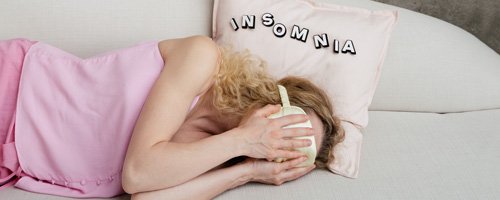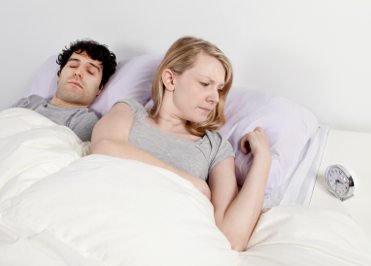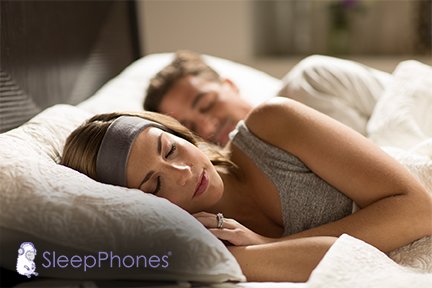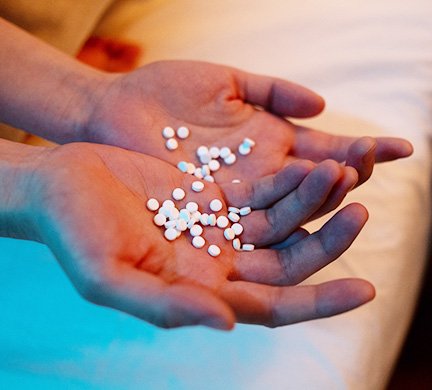Fight Insomnia with SleepPhones® Headphones

Free Insomnia Solution for the Insomniac — Explained by a Family Physician
People with chronic or severe insomnia often say that they dread bedtime. They hate trying to go to sleep. They know it will be one more night of staring at the clock, thinking about how they have to be upright and working again in 5 hours, 4 hours, 3 hours... It's a huge struggle trying to concentrate and not yawn through the next day. And yet, they are so tired and irritated! It's just that when they lay down to sleep, the brain begins to wake up and the body is wracked with anxiety and exhaustion at the same time. It's an extremely frustrating experience for anyone who has gone through it. Thankfully, there is a wide variety of insomnia solutions, some more natural than others.
Over-the-Counter Medications

If the insomniac comes in to see me, then they've tried Tylenol PM, Unisom, Simply Sleep, and other over the counter sleeping pills. Hint: Generic Benedryl is probably the cheapest option — they are all made from the same active ingredient, diphenhydramine. Benedryl is known to cause hangover effects and a dry mouth. It often dulls a person the next day, so it is not ideal. Plus, some people have a paradoxical reaction to Benedryl, making them more hyper and unable to sleep. Those people can sometimes have a similar reaction to alcohol. Instead of being slightly sedated like most people who drink alcohol, they become more agitated and excitable. If it works well though, it's a fine option, and relatively safe, even when used frequently. It says to not use it long-term on the package because sometimes insomnia is caused by or related to other medical problems, so you should see the doctor if you have chronic insomnia.
Some insomniacs have tried the more "natural" melatonin, valerian root, chamomile tea, or warm milk. The problem with herbals is that it is not controlled by the FDA, so there is no guarantee that you are getting what you are buying. The dosage may vary greatly from one pill to the next so the results are inconsistent. Certainly herbal tea and milk can be calming, so it's worth a try. However, if you are allergic to ragweed, you should avoid chamomile, which is a relative of ragweed. I recommend trying melatonin products to travelers with frequent jet-lag. But for the severe insomniac, melatonin usually doesn't work well enough.
Other Problems Caused by Insomnia
Insomnia is dangerous when it makes someone so tired they start falling asleep at the wheel. It also makes people gain weight because the hormones produced during sleep suppress appetite. Plus, the body makes more steroid hormones during the day to keep a tired body awake, and that increases appetite. The steroid hormones can cause metabolic syndrome, making insulin and blood sugars chronically high, leading to diabetes. It is extremely important to get enough sleep for many reasons, but for insomniacs, sleep just seems impossible.
Hope for Insomniacs

When I see a patient suffering from insomnia, I have a few tricks up my sleeves. First, there is the ever-powerful placebo effect. No, I'm not kidding. I tell them that there is hope and that there are many treatments out there that can help. There is one treatment that is bound to work. So there's no reason to give up hope. Most insomnia treatments are quite safe, non-addictive, and effective. Some treatments can be used in combination with each other. Once the insomnia is treated and sleep is finally stabilized, we can wean off any pills. Confidence in being able to fall asleep again is critical for stopping insomnia. The insomniac views the bedroom as a bad place, wrought with frustrations. Just thinking about sleep is anxiety-provoking. Once the bedroom is a friendly inviting place for rest again, insomnia can be cured.
The sleep hygiene rules are a set of completely natural tips that help with mild sleeping problems. The most important thing is to maintain a regular sleep schedule. Do not eat a dinner that causes heartburn. Avoid exercising or caffeine after dinner. Keep the bedroom cool, dark, and quiet, which means no TV. Avoid long naps during the day. These are great guidelines to help people sleep well in general. However, the tired insomniac may not be able to fight insomnia with those tips alone.
Help! — Detailed Guide to Treating Severe Insomnia
I recommend the following:
- Decide on a time to wake up in the morning. Let's say 7am for this example.
- Count back 10 hours. That would be 9pm.
- At 9pm, one should not exercise anymore. Do not eat any meals beyond this point. Do not do anything exciting. Taking a relaxing stroll, a candlelight bath, or reading a book would be good activities for this time.
- At 10pm, one should prepare for going to bed. So changing into sleeping clothes, brushing, flossing, defrosting the next days dinner, preparing the next day's lunch, or packing one's bags for the next day are good activities. Making a to do list or a shopping list is okay too, but not if it's too anxiety-provoking.
- At 11pm, settle down to sleep. Set the alarm clock, put on SleepPhones® headphones, and listen to your favorite sleep track. If you just want nature sounds, we offer those on our CD, and on free download. Take 10 deep breaths, counting 4 seconds each for the inhale, the exhale, and the time between breaths. If you prefer to be guided into sleep, I recommend self-hypnosis tracks, such as those offered by Dr. Steven Gurgevich.
- Wake up at the time that you should wake up and open the curtains or turn on the lights to get some morning light. Having exposure to some light upon awakening is helpful to train your brain. Whether or not you drink any caffeine in the morning is up to you. I do not recommend any more than 1-2 small cups of coffee a day. 3-4 cups of a light tea is fine. Red Bull, Monster, and other such "energy" drinks are strongly discouraged. They contain excessive caffeine and sugar.
- Stay active during the day, taking the stairs instead of the elevator. Take a short walk during lunch hour. Try to walk 10,000 steps a day. If you do that, there is no need to spend money on a gym membership.
- Eat at least 3 times a day. Healthy snacks between healthy meals is fine. Eat slowly, savoring each bite, and relax.
- One alcoholic drink a day is fine, but no more than that. Studies show that drinking more than two drinks a day causes more sleep disruptions.
- Around 9pm, begin to relax again.
- After trying the above method for 3 days, if it is starting to work, then continue. If it has not helped at all, then start a prescription sleeping pill and change the sleep track. Take the prescription sleeping pill about 15 minutes before going to bed. Continue to use the SleepPhones® headphones. That way, weaning off of the sleeping pills will be easier if you are already in the habit of falling asleep with your favorite SleepPhones sleep track. If you travel a lot, be sure to bring your SleepPhones along! SleepPhones can be like a security blanket sometimes because it's soft and relaxing.
Prescription Sleeping Medicines

As for prescription sleeping pills, there is a wide variety of them. The main ones are in these categories.
- Sedative-hypotics (the Z-drugs) — Ambien, Sonata, Lunesta
- Anxiolytics (benzodiazepines) — Xanax, Valium, Klonopin, Ativan
- Antidepressants — Trazadone, Elavil
- Synthetic melatonin — Rozerem
The anxiolytics are the classic sleeping pills, with the bad reputation of being addictive. They work well, but I prefer to start with the Z-drugs. These are the newer sleeping pills with the main effect of bringing on sleep. They are not physically addictive, so the dosing would never need to be increased. Stopping them abruptly would not cause physical withdrawl problems. Ambien is the oldest of the group and is well known for its effectiveness. These Z-drugs work for most people, but sometimes, one works better than another, so it is worth trying another Z-drug if the first one didn’t work. The biggest side effect I watch for is sleep walking. I never prescribe it to a sleep walker, since it makes the problem worse. Only one person has ever complained of eating more in the middle of the night to me, and it was not exactly sleep eating. None of my patients have had sleep driving. A sleep walker is at increased risk for sleep eating (binging on random things, including inedible objects like paper plates smothered in ketschup) or sleep driving, which is obviously very bad. Other that that, the Z-drugs are quite effective and safe for insomnia. The biggest drawback for most people is the cost. Since they do not cure the root cause of insomnia, it something that might be taken long term. They are at least a few dollar a pill, so a month of pills cost far more than SleepPhones® headphones.
The anxiolytics are good medications for calming people down. They are addictive though, especially when used inappropriately. Short-term use or steady long-term use are possibilities as long as the dosing does not need to be continually increased. Because they are scheduled substances, the drug enforcement administration watches the doctors writing these prescriptions with severe penalties for over-prescribing, so some doctors are very reluctant to prescribe these. The people who benefit most from these medication are those with underlying anxiety. But people with a tendency to abuse alcohol must avoid these medications.
The antidepressants Trazadone and Elavil are probably more effective for sleep than they are for depression. They are very old medications and therefore very cheap. The main drawback is a dry mouth, potential for hangovers, and drug interactions. They are generally safe for long-term use and are not addictive. But one should taper off of them rather than stopping abruptly. I think they are not great insomnia solutions because of the annoying side effects frequently reported.
Rozerem is another insomnia treatment in a pill form, but this one is completely not addictive. It is a synthetic melatonin that is supposed to work only on the brain’s melatonin receptors controlling sleep. It is still a relatively new drug, with unknown long-term effects and very expensive. It works for some people and not for others. The effectiveness is not as consistent as with the Z-drugs in my experience. Like melatonin, it would probably work better for jet-lagged people rather than the chronic insomniac. I would like to see a few more years of experience with this medication before prescribing it more regularly.
A Holistic Approach
There are many things that can impact sleep. Sometimes it is work or school stressors. Going through a divorce is one of the most stressful events in a person's life. Even marriage, moving, or starting a new job can be extremely stressful. Recognizing the stress that started the insomnia can be helpful. Sometimes the fear of a bad night or anxiety associated with trying to sleep can perpetuate the insomnia beyond the stressor. For example, staying up late studying for a big exam then worrying about the results afterward can start an episode of insomnia. But then the lack of sleep and messy sleep schedule spiral out of control, leading to prolonged insomnia, long after the exam is over. Looking within and figuring out what started the insomnia and what's causing it to perpetuate helps one understand the disease. Sometimes one can prioritize a fix to the stressor if one recognizes its full impact. Psychotherapy is a great natural insomnia treatment, if one can afford it.
Medical Problems
Some medical diseases can cause or worsen insomnia. These problems are often intertwined. Mental illnesses such as depression and anxiety frequently disturb sleep. Even diabetes, allergies, arthritis, heart disease, or high blood pressure can affect sleep. In fact, most medical problems affect sleep, which is why older people tend to sleep poorly due to accumulating medical conditions. If allergies are causing lots of snoring or coughing at night, then treating it may be more beneficial than not. If pain from arthritis is preventing sleep, then taking some plain Tylenol at night might help. Getting a good night sleep is so important to feeling good the next day and preventing other illnesses that it may be worth treating an otherwise minor problem.
Seeing the Doctor
This article is to help you understand more about sleep from my perspective. It is not intended to diagnose, treat, or advise you about your own medical situation. Please consult your doctor for your insomnia.
There are many treatment options for insomnia. Some will work better than others, and natural lifestyle changes can always be used in conjunction with medications or SleepPhones® headphones. You should ask your doctor if you are on any medications or have any other medical problems that could be impacting your sleep. Sometimes a cure is as easy as stopping another pill! It may take some time, but you can stop insomnia with the help of your doctor!
Learn more about the drug-free SleepPhones for Insomnia!
Ready to try SleepPhones? Here they are.
Find more about managing sleeplessness at our "Insomnia" resource page.
